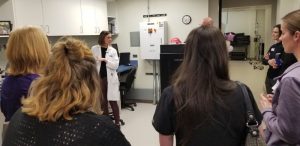
Veterinarian Meagan Sowders, a member of the local multidisciplinary oncology team for the VCA Aurora Animal Hospital, talks to visiting animal care professionals about the new Varian Halcyon Linear Accelerator that is being used to treats pets with cancer. (David Sharos / The Beacon-News)
Area veterinarians and other animal health care professionals came to the VCA Aurora Animal Hospital Wednesday night to network and view the new Varian Halcyon Linear Accelerator that is being used to treats pets with cancer.
The event included an overview about how the VCA Pet CancerCare Alliance operates as well as the chance to listen to resident Dr. Meagan Sowders, a member of the local multidisciplinary oncology team that designs treatment plans for pets.
Referral coordinator Courtney Anderson said the event was being offered as a meet-and-greet of VCA staff as well as a way for local professionals to view and ask questions about the new oncology machine.
“The Halcyon offers radiation therapy and we began construction of the machine last August and it finally went live Nov. 7 so we’ve had it about two months,” she said.
Anderson said the hospital “is not visited regularly by other veterinarians” and that the purpose of the event was to make the clinic available and give local animal health care professionals the chance to spend some time together as well as talk with Sowders and learn more about the machine.
She said the technology itself was first introduced about 30 years ago but used cobalt “which had a lot of bad side effects.”
Veterinarians Sarah Rippy, left, Steven Abel and Meagan Sowders all work together at the VCA Aurora Animal Hospital that now uses a new machine known as a Halcyon Linear Accelerator to treat cancer in pets. (David Sharos / The Beacon-News)
“The machines then didn’t penetrate the tissue but now we have a huge upgrade in what you might call a giant x-ray that we call ‘linear accelerators’ and there is no radioactivity,” Sowders, 35, of St. Charles, said. “The VCA has bought about 12 or 15 of these throughout the country and this machine, which offers radiation therapy, might even be more advanced than some hospitals use on people.”
Sowders said since the machine went live, the clinic has been using it “in five to seven cases a day” and that four weeks of daily treatments or a more intense technique is used on sick animals.
“We have a stereotactic therapy that involves just three treatments,” she said. “This treatment is advanced but it’s not a cure. We can sometimes achieve control of the disease and provide the animal with three to five more years of life.”
Dr. Sarah Rippy, 34, of Aurora, works with Sowders and echoed the same enthusiasm about the machine, saying that it “lets us give radiation with fewer side effects.”
“This offers no changes on what I do with the chemo front and it provides better, local disease control,” she said. “It gives us more options after we see the initial tumor.”
Dr. Steven Abel, 59, of St. Charles, said he heads up the surgical team at VCA and that while “surgery can remove things – it can’t remove everything” and that the new machine “allows us to reduce a tumor or perhaps spare a limb.”
According to Eric Stewart, global managing director of veterinary oncology for Varian Medical Systems of Palo Alto, California, the machine, including software and a full solution package, costs a total of somewhere between $2.5 million and $3.5 million.
VCA staff said treatment costs range from $7,000 to $10,000 which would suggest many pet owners might not be able to afford saving or treating their pet.
But Stewart and others argue the trend in America among pets and their owners is changing dramatically.
“Data shows that pet spending hit $75 billion in this country in 2019, up $25 billion in the past eight years,” he said. “It’s projected to increase to $96 billion in just two years. Our annual spending is at an all-time high and dog ownership jumped 12 million from 2015 to 2017, which was the largest jump ever. These are unique times from an economic standpoint and the demographics of people and their pets.”
Rippy argues that both people and their pets are living together longer which also means pets are more likely to develop cancer due to their increased longevity.
“Pets aren’t being attacked by other animals or getting hit in the street as much and unless something else happens – if they live long enough – most will develop some kind of cancer,” she said. “Gene damage develops, but there are people who bring in pets and will pay whatever they have to in order to save them.”
David Sharos is a freelance reporter for The Beacon-News.
From The Chicago Tribune








